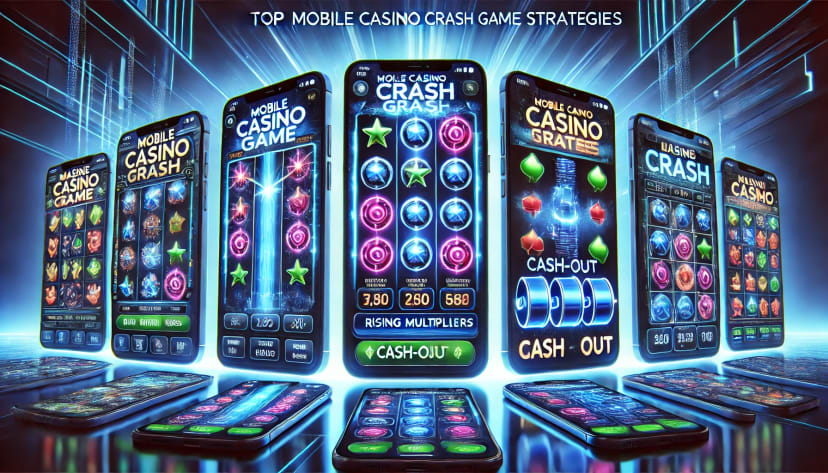Crash games have become a standout favourite for Canadian players, captivating gamers with their fast-paced action and potential for big wins. These games rely on advanced algorithms to determine outcomes, creating a dynamic experience where timing and strategy are key. Grasping how these algorithms operate is essential for players who want to ensure they're engaging with fair and transparent gameplay.
In this article, we'll dive into the role of algorithms in crash games, explain how fairness is maintained through technologies like Random Number Generators (RNG) and Provably Fair systems, and highlight the steps developers take to build trust and transparency. Whether you're a casual player or a seasoned pro, this guide will offer valuable insights into the mechanics behind the thrilling world of crash games.
How Algorithms Drive Crash Games
Algorithms are the engine behind crash games, powering every element of their dynamic and fast-paced gameplay. At their core, these systems generate results by introducing randomness to determine the crash point for each round, ensuring that every game is unpredictable and fair. The multiplier, which starts at 1x and climbs steadily, reflects both the potential payouts and the increasing risk, challenging players to decide the perfect moment to cash out. This delicate balance between randomness and calculated payouts keeps the gameplay exciting and engaging for players.
The relationship between multipliers, randomness, and payouts is crucial to the success of crash games. Advanced algorithms use Random Number Generators (RNG) to ensure that every outcome is truly random, creating a fair environment where no one can predict or manipulate the results. Additionally, these algorithms are designed to provide a consistent experience that aligns with the game’s Return to Player (RTP) percentage, offering players transparency in terms of potential rewards over time. For insights into Canadian mobile casinos offering games with proven fairness and transparency, explore our expert reviews at MobileCasinoRank.
How Random Number Generators (RNG) Work for Fair Play
Random Number Generators (RNG) are fundamental to crash games, ensuring fairness and unpredictability in every round. These advanced algorithms generate random outcomes, determining the crash multiplier for each game and preventing any external influence or bias. Understanding how RNG works is key to appreciating the transparency and integrity of crash games.
What Exactly is RNG?
RNG is a sophisticated mathematical algorithm that produces sequences of numbers that appear completely random. In crash games, the RNG dictates the multiplier at which the game will crash, creating an unpredictable and fair environment. The process typically begins with a seed value, often combined with additional inputs, to generate unique outcomes for each round. This ensures that every multiplier is independent of previous results, making the gameplay truly random and unbiased for all Canadian players.
Keeping Crash Games Unpredictable
The RNG system guarantees that the crash point for each round cannot be predicted, giving players an equal opportunity to strategize without any fear of manipulation. Developers implement rigorous testing and validation processes to ensure the RNG operates correctly, often involving third-party audits to verify its integrity. This inherent unpredictability is what makes crash games so thrilling and fair, as players must rely on their timing and decision-making skills rather than trying to spot predictable patterns.
Clearing Up Myths About Randomness
One common misconception about RNG in crash games is the idea that patterns or trends can be used to predict outcomes. While players might notice streaks of high or low multipliers, these occurrences are purely coincidental and have no impact on future results. Another myth is that RNG can be manipulated by players or casinos, but reputable game developers use advanced encryption and rigorous testing to ensure this is impossible and maintain a secure gaming environment for everyone.
By understanding the role of RNG in crash games, players can appreciate the fairness and integrity of the gameplay, focusing on strategies that align with the random nature of the game rather than trying to outsmart it.
What is Provably Fair Technology?
Provably Fair technology ensures transparency in crash games by allowing players to verify the fairness of each round. It works using player seeds, server seeds, and hash verification, enabling players to confirm that results were not manipulated. Unlike traditional RNG, which relies on external audits, Provably Fair systems empower players to independently validate outcomes, fostering greater trust and confidence. This innovative approach has become a game-changer, especially in crash games, where fairness and transparency are essential to the gaming experience.
Benefits of Fair Algorithms for Players
Fair algorithms provide players with a secure and enjoyable gaming experience by ensuring transparency and integrity in every round. Here are the key benefits:
- Builds Trust: Players feel confident knowing outcomes are unbiased and verifiable.
- Improves Gaming Experience: Fair systems allow players to focus on their crash game strategy without concerns of manipulation.
- Ensures Transparency: Transparent processes foster trust and strengthen a casino’s reputation.
- Encourages Responsible Gaming: Clear and fair systems help players make informed decisions.
- Provides Consistency: Reliable algorithms ensure predictable and enjoyable gameplay.
- Attracts More Players: Fairness and transparency attract a broader audience to casinos.
- Supports Long-Term Engagement: Trustworthy algorithms keep players engaged over time.
These benefits highlight why fair algorithms are essential for both players and casinos, creating a balanced and trustworthy gaming environment.

Tips for Choosing Fair Crash Games
Selecting fair crash games is crucial for ensuring a trustworthy and enjoyable gaming experience. With so many options available, knowing what to look for can help you identify games that use transparent and reliable systems. By focusing on technology, certifications, and casino reputation, you can enhance your confidence and maximize your gameplay.
- Look for Provably Fair Technology: Check if the game uses Provably Fair systems, allowing you to verify outcomes using player and server seeds.
- Review Certifications: Ensure the game or casino is certified by reputable third-party auditors, such as eCOGRA or GLI, which validate fairness and RNG reliability.
- Research Casino Reputation: Choose mobile casinos with a strong track record for transparency and fair practices, backed by positive user reviews.
- Check RTP Information: Look for games with a clearly stated and competitive RTP (Return to Player) percentage to understand expected payouts.
- Use Trusted Platforms: Stick to well-known and licensed mobile casinos, such as those reviewed on MobileCasinoRank, to ensure security and fairness.
By following these tips, you can enjoy crash games with confidence, knowing that fairness and transparency are guaranteed.
Conclusion
Crash games combine excitement with strategic decision-making, but their appeal hinges on the fairness and transparency of the algorithms that power them. By understanding how features like Random Number Generators and Provably Fair technology work, players can feel confident that every round is unbiased and trustworthy. Selecting games and platforms with certifications, transparent systems, and strong reputations further enhances the gaming experience.
Fair crash game algorithms not only build trust but also improve player engagement, creating a secure and enjoyable environment for everyone. Many mobile casinos also offer exclusive bonuses and rewards, such as deposit matches or free spins, that can enhance your gameplay and provide additional opportunities to win. To make the most of your crash gaming journey, explore expert reviews and resources on MobileCasinoRank, and always prioritize fairness and responsible gaming in your choices.
FAQ
How do fair algorithms build trust in crash games for Canadian players?
Fair algorithms guarantee that each game outcome is unbiased and transparent, which helps Canadian players feel secure that results haven't been manipulated. Technologies like Provably Fair systems give players the tools to check the fairness of every round.
Why is transparency important for fair algorithms in online casinos?
Transparency lets players see how outcomes are created. Features such as hash verification and audits by independent parties help to build trust by showing that algorithms work fairly and safely.
Why is RTP important when playing fair crash games in Canada?
RTP (Return to Player) shows the percentage of total bets that a game gives back to players over time. Higher RTP values in fair games mean better long-term chances for players and show how fair the algorithm is.
How do I find crash games with fair algorithms at Canadian online casinos?
Look for games that use Provably Fair technology, have certifications from respected auditors, and are known for being transparent. Online casinos often highlight games with verified fair algorithms.
















